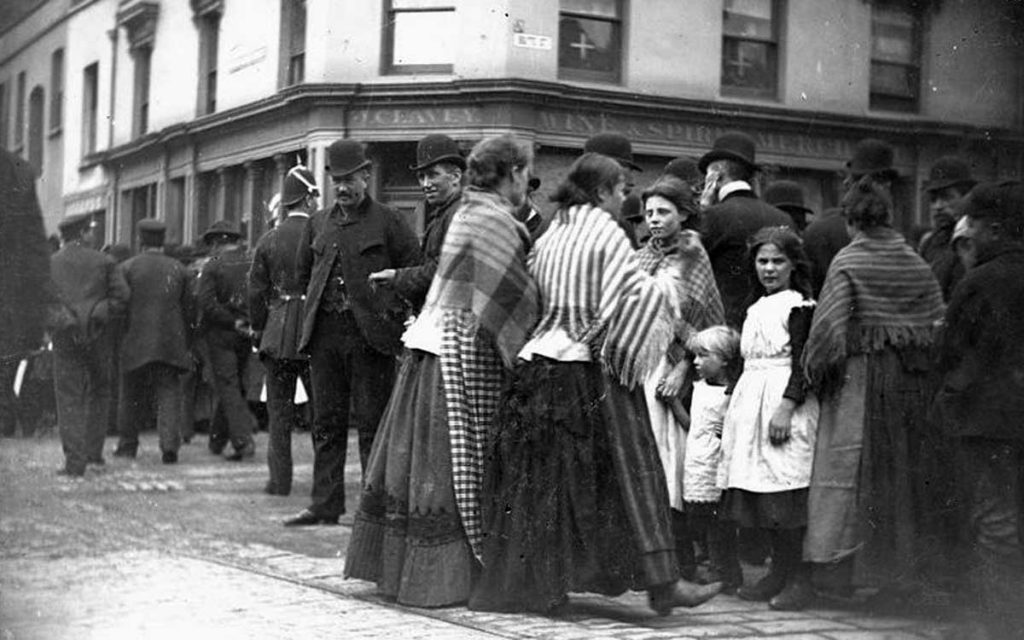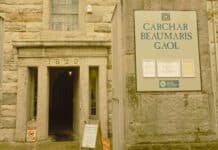
CLAIRE BARRAND reveals the lack of sympathy shown to impoverished women forced into crime and prostitution in Victorian Wales
Can we still feel the residual energy within an area, particularly where dark, disturbing, depraved debauchery and corruption took place?
Can historical events that took place hundreds of years ago still cast lingering shadows of moods that are tangible to us today?
Paranormal investigators that endeavour to understand why ghosts linger on the earthly planes, those that attempt to communicate with the lost spirits that still remain in the dark corners of our world, should undoubtedly examine the times past of a haunted place.
I found this amazingly written piece in the South Wales Daily News archives dated 19 December 1877.
To me there is no better insight than finding something written at the actual time it took place, whereas there is a notable lack of empathy the writer towards these poor wretched women, one can only now sympathize at the life of vice they were forced to live to survive.
One can just imagine the horrors that must have taken place in these streets.
Murder, rape, and theft were the order of the day in places that even the police dare not venture down alone at night.
As this insightful description unravels, it gives us a fascinating glimpse into the most impoverished suburbs of the Welsh Capital of Cardiff city’s past.
Low Life in Cardiff (By Our Special Commissioner)
“Vice, like crime, possesses an inherent tendency to centralise. Though debauchery and lawlessness are never drawn completely outside the pale of the community; though their ramifications, seen and unseen, confront us in some shape or another at every turn, often where least expected, there is always a place where their votaries herd, and where their characteristics are concentrated.
This plague-spot is not always a locality whereabouts are well known to outsiders. Sometimes it is hidden away in the heart of a labyrinth of streets, the character of which is little known to the general public but in Cardiff the case is different.
Everyone knows the evil odour attaching to Custom Home-street, Charlotte-street, and a street parallel and very nearly opposite the latter. Few know how much infamy and baseness are concentrated within the limits of those three streets. In Cardiff, as in other large towns, prostitution lies at the root of the lawlessness which troubles the community. Not that it is the cause of it; it is only one of the causes, and combined with drunkenness, it is found bound up with the other forms of vice, and with the crime which festers in our midst.
It is especially the case in Cardiff, as it is in other seaport towns, and among communities continually reinforced by a floating population, that this form of immorality is most openly rampant. It exists elsewhere, perhaps, in as extensive proportions, but its existence is not so palpable, nor do its abominations seem so glaring.
No one who has passed up and down the streets mentioned can have failed to have been struck with the evidence of corruption and infamy with which these streets are choked.
But if the aspect of low passion be abhorrent by daylight, when the exhausted fires of sensuality seem dying out, and hid under the slough of drunken, half-somnolent vacuity, the abomination is ten times more abominable by eight, when the demoniac re-awakening comes. Then the filthy streets are given over to the dominion of the demi-rep. The air is full of drunken, obscene voices; the mud beneath your feet, and on the greasy pavements, seems in fitting keeping with the loathsomeness in which the place is steeped. The foul spirit seems to have tainted the very walls of the houses.
You would hardly deem the low-roofed, squalid tenements capable of accommodating their visitors. As the evening wears on, a constant stream of men and women flows in and out of the dark, narrow passages, enters the low-browed doorways, and comes and goes until closing time, when doors are barred and shutters drawn, though the light through the chinks and the noises from within give token of the unholy revelry prolonged long after the streets are quiet and deserted.
There is none of the alluring lights or pleasantness, sometimes ascribed to the siren attractions of vice, to be seen here. When the women are clad in gay finery, it covers dirty repulsiveness and filth rendered the more hideous by its meretricious tricking out. Gaunt-cheeked, blear-eyed infamy, besotted, sensual passion without one ray of gaiety; sullen misery which the lecherous gibe and the forced amatory leer serve to render the more hopeless – these impel themselves on your attention with painful intensity at every turn.
On young and old faces, on the face of the child of fourteen, already knowing more of the mazes of vice than many a grown matron, and on the withered face of the old hag from whose features every trace of womanhood has vanished, you would look in vain to find any other expression than dogged weariness and the lines of black despair.
Does illicit passion ever bring with it to these that quick, hot joy which casts the glamour of romance over immorality? No one who watched the miserable daily life of these wretched ones would say so.
Enter any of these houses, crowded as they are, when the drunken revelry is in full swing, or when “the victims” (to whom no sympathy need be extended, as they never are and never can be made to feel the bitterness of a constant hopeless sinking lower in the depths of infamy, as these women are made to feel it) have been drawn into the meshes of the net.
There is no passion, no voluptuous allurement here.
The woman follows a degrading trade every day of her life is a step drawing her downward. If you were permitted to go through all the houses (and the writer has visited every notorious house in each of the three streets named) you would be struck in each by one prominent characteristic the inmates live a hand-to-mouth existence, and poverty stalks hand-in-hand with vice, here, at any rate, its remorseless accompaniment.
There is hardly one of these women who is unfamiliar with the interior of a prison. Many of them are old gaol birds; the youngest of them know what “three months” is like, and look forward to it as an inevitable part of their career, to be accepted a naturally as spending a night’s earnings in the night’s debauch and awaking penniless and with no hope of breakfast.
Even this frail sisterhood is a sisterhood.
If a girl or woman is without money, she is open to receive her share from her fellows who may have been in luck’s way. She does not starve as long as she remains on good terms with the others, though she often has no money in her pocket to pay her lodging, and her shawl and hat are in pawn. These houses are frequented chiefly by sailors -common seamen for the most part, though sometimes you may meet here foreign captains, mates, stewards, and men a better class than the ordinary frequenters.
But these streets are principally supported by the lowest class, whom it is not, however, in every instance, correct to describe as the scum and dregs of humanity, for you may too often see men here who, when they are not in drink, or carried away by the gusts of passion, are good, peaceable workmen. Still, the variety of the visitors is great, and the young rough and the old rough, the gambler, the beggar, and the thief are to be met with, as well as sailors, Tho number of foreigners frequenting these haunts is amazing, and it is strange to hear the babble of conversation in an unknown tongue carried on fluently by the girls, who show a marvellous readiness in interpreting the meaning of visitor phrases.
Copious drinking goes on constantly. The women drink with the men in the public-houses; and whether they come home before the publics are closed, or are turned out at closing hour, there is always drinking afterward. The girls mostly drink with the determination beforehand to get drunk the men, generally, with a slowly-ebbing determination to remain sober enough not to be robbed. If that determination holds out until he reaches the house, the “victim” finds there is little chance of his keeping it, for he is always subject to the liability of having his liquor drugged.
Frequently the man breaks away as the suspicion that this fate in store for him flashes on his mind, but more often the idea does not come to him until he is too far gone to carry his determination into effect; when the drink has slowly muddled his senses, and passion is blinded and stupified. Then woe to him if he be a sailor carrying with him the earnings of a long voyage next morning, mayhap long before morning, he finds himself thrown into the street, with empty pockets and an aching head.
His passion of last night has wrought its work, and the contents of his pockets have gone to feed the lunatics to whom he surrendered.
It may be that in his drunken daze he has had strength enough to leave the house, to be watched and waylaid by the roughs who choose drunkards as their special prey or to receive friendly shelter of the police-cell for the remainder of the night or the morning. Generally, if he is a stranger, as soon as he has been plucked he is turned adrift. The time of his expulsion depends on the duration of the plucking process. If he be a frequent visitor he stands the chance of a better fate; even then, he has before him the probability of having his head broken or his eye blacked in one of the brawls which usually disturb night’s serenity. He may not necessarily be a party to the row, but the women, excited by drink, quarrel frequently, and he is as likely to be mauled as one of the disputants.
He runs the risk, too, of the unexpected entrance of the police, who appear on the scene at most unexpected times, and then he may reluctantly be driven ignominiously off the premises. There is never much difficulty in obtaining drink. There are houses stored with liquor which is bottled away in innocent-looking cupboards, or packed in the cellar. Besides, beer may always be brought in in large quantities in the great tin cans, two or three of which one always sees on the tables in these houses.
As to a man getting back his money after he has been plundered, the victim is generally too shamefaced to make the effort, and when he does, the spoil has been distributed; it is in other hands, even if the remote possibility of there being any inclination to give it back could be supposed. A good haul does not go for much. There are high rents to be paid (these houses are much more lucrative property than many more pretentious structures), and there is generally a good long score with the landlord to be paid off. The owners find the property a better investment than the wretched inmates, on whom debauchery, privation, and exposure soon begins to imprint their deadly marks.
There are plenty of other houses devoted to the same purposes in other parts of the town, but nowhere do they show themselves in such hateful prominence as in this quarter. The evil intrinsically none the less and none the greater for being kept within the limits of decency that does not offend the passer-by; it exists abundantly enough elsewhere, but here its darkest side is most obtrusively offered to the public gaze.”







